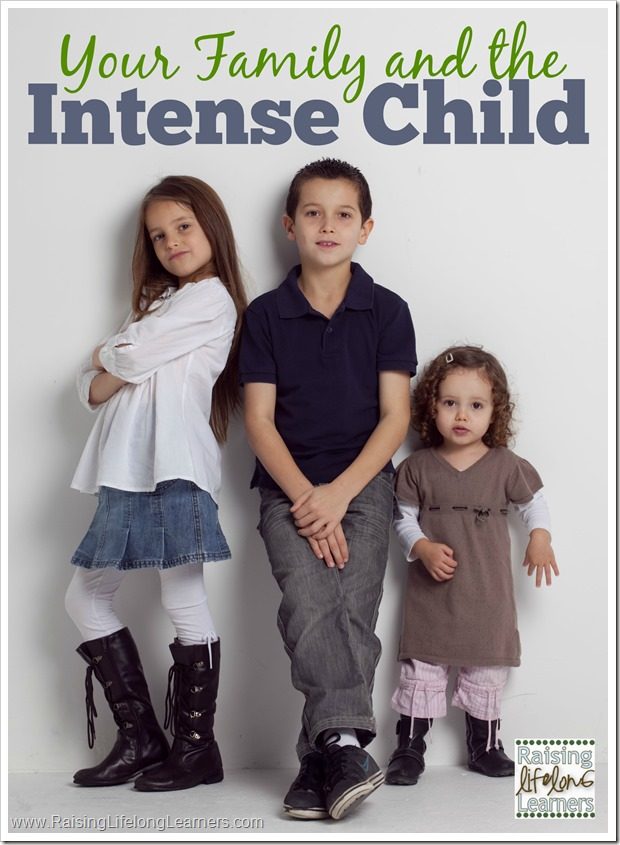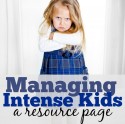The Family and the Intense Child
You know you’re raising an intense child, but you’re at a loss as to how to ensure his success at family gatherings, co-ops, classes, and in any other situation where he’ll be over stimulated and off schedule. Right?
And the holidays bring about special challenges.
The first step towards success is to make sure that everyone in the family is on the same page going into any situation where your intense child may struggle.
Did you start a notebook yesterday? If not, go back to yesterday’s post and do that. I’ll wait, because you’ll need to know what intensity looks like in your family and have at least begun to think about your child’s triggers.
Get On the Same Page as Your Spouse
Now that you have a list of your child’s intense characteristics, behaviors, and triggers, take a bit of time and talk them over with your spouse. It’s important for the adults in an intense child’s life to be on the same page. It really, really is.
Acknowledging the characteristics that make your child who he is can be very powerful. It’s about temperament. It’s not choice. Your intense child is intense. He thinks deeper, feels more, and pushes through with perseverance.
Those traits can produce challenging behaviors. Getting hurt feelings by projecting thoughts and reactions onto others… Being bossy when he wants his own way or to choose the direction of the play himself…
But, those traits can produce some amazing behaviors, too. Recognizing potential problems and coming up with preemptive solutions because he is thinking scenarios through ahead of time… Displaying empathy for an injured friend or noticing someone being left out, and soothing and including them…
It’s up to parents of intense children to recognize the potential for troublesome behaviors, head off triggers, and channel those characteristics for good. That is not a job easily done by one parent. If you are a single parent to an intense child, enlist the help of a close family member or friend.
Get on the same page… and stay there.
Hold a Family Meeting
Whether you have one child or ten… Whether all of them are intense, or just one… Whatever your situation, you are a family. A unit. And you need each other.
And, therefore, you need to have everyone know what to expect and how to help.
Take some time to talk as a family regularly. Have each child share their feelings and struggles. Discuss the difference between their feelings and their behaviors. Anger is a feeling – and they have every right to experience it. A behavior is always a choice, and they never have a right to lash out at another.
Now, I know this isn’t easy. I know that many of you reading this are doing so with tears in your eyes because your child doesn’t choose to control his anger and you can’t leave him alone with his sister because he might punch her if she knocks over his LEGO ship accidentally.
Many of you are reading through blurry eyes because your child flashes and burns and there never seems to be hope that he’ll choose differently. And you just don’t really want to go to another party. Or store. Or class. Or anywhere if you have to take your child.
I know.
I’ve been there, and am often still there.
But behavior IS a choice. The choice between right and easy {wrong} is always hard. And, it’s harder for intense kids. They can do it, but it takes a lot of coaching and help – from the whole family.
So, talk about it as often as you can. Meet regularly. Develop a family mission statement and revisit it often. Implement and stick with an easy system of discipline. But, keep your discipline plan healthy, positive, and loving.
In your meetings, talk about feeling and behaviors, and then help each child identify the triggers that set them off. Even if one of your children isn’t intense, chances are high that he has something that rubs him the wrong way. Help him identify that trigger and then start brainstorming other options.
Help Your Children Develop Empathy
My 5 year old has sensory issues. When she gets overwhelmed or overstimulated, she seeks input. We all know this, because we’ve all been rubbed, kissed, hugged, or hung on by her at strange moments in time. Because we’re a team, we all pitch in as we can. While my son avoids touch, he helps his sister find a parent, relative, or the other sister to help out. I’ve come upon my 7 year old daughter holding her 5 year old sister in her lap and rocking back and forth, rhythmically.
She just knows what her sister needs, and takes time to help if I’m busy with the toddler or can’t be found.
Unfortunately, sometimes they all have needs at once, and that sweet scene doesn’t happen. But because we take time to talk to the kids together, and regularly, about the difference between their characteristics/needs, their behaviors, and their triggers, they know what to look for, what to avoid, and how to help if they are able.
They have empathy for one another.
One of the most important skills a child can learn is to empathize with others. For an intense child this can be very tough. She is hyper focused on whatever she is currently focusing on. Worrying about others and their needs doesn’t fit comfortably in that scenario.
But it’s so important that children know they are not the only ones whose needs must be met. Sometimes it feels like an uphill battle, but it is possible when everyone in the family forms a unit and sticks together through regular, open, and loving communication.
We’re almost there. Developing a plan to get you through all of the holiday parties and overstimulation that goes with this time of the year can serve you well into the future and strengthen your family.
Take some time and read back through, starting at the first post in this series, along with the other posts and resources you can find below about raising intense kids. Keep jotting down characteristics as you think of them, along with the behaviors and triggers associated with them.
Tomorrow, we’ll do some role playing exercises and come up with strategies that you and your kids can use to head off meltdowns and explosions wherever you go, whatever time of the year.
Previous Articles About Intense Kids










